Lancelot/Discover Lancelot/ca: Difference between revisions
Created page with "== Ús bàsic ==" |
Created page with "=== Seccions ===" |
||
| Line 31: | Line 31: | ||
It shows four sections - <menuchoice>Applications</menuchoice>, <menuchoice>Computer</menuchoice>, <menuchoice>Contacts</menuchoice> and <menuchoice>Documents</menuchoice>. | It shows four sections - <menuchoice>Applications</menuchoice>, <menuchoice>Computer</menuchoice>, <menuchoice>Contacts</menuchoice> and <menuchoice>Documents</menuchoice>. | ||
=== | === Seccions === | ||
==== Applications ==== | ==== Applications ==== | ||
Revision as of 22:36, 26 March 2011
The first section takes you on a guided tour of Lancelot. The second section is dedicated to more advanced options and concepts.
Informació general
Introducció
Lancelot is an application launching menu for KDE Software Compilation.
Lancelot o Kickoff?
Lancelot provides many features and configuration options that Kickoff doesn't. For a more detailed comparison, see comparison to other launchers.
Kickoff is the default application launching menu for KDE SC. To replace Kickoff with Lancelot, you need to add it via the 'add widgets' panel. For more info on how to add and remove widgets to the panel, see Plasma HowTo.
Lancelot o KRunner?
Lancelot can be used as a KRunner replacement. See comparison to other launchers for a list of benefits.
By default, Lancelot can be accessed via Alt + F5 shortcut (can be changed).
Ús bàsic
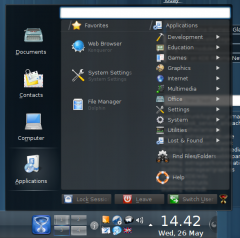 |
Lancelot, with default settings |
When you click the launcher icon you added to the panel, the Lancelot menu will open.
It shows four sections - , , and .
Seccions
Applications
The Applications section contains a list of your favourite applications in the left column, and application categories in the right one. If the application that you are looking for is not in the list of Favourites, you can browse the categories on the right just by selecting one of them.
When you dive into the categories, the Favourites section will disappear to provide more space for the browsing. You can always return to it by using the breadcrumb bar on the top.
Computer
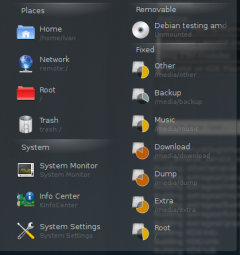 |
Computer section of Lancelot |
The Computer section contains list of defined places (as seen in Dolphin), some useful system applications and a list of storage devices.
You can eject/mount/unmount removable devices directly from the menu just by right-clicking the desired one and choosing the appropriate option from the context menu.
Contacts
The Contacts section shows the list of unread mails from Akonadi (KMail) and online contacts from Kopete.
Documents
The Documents section shows a list of office applications on the left, and a list of currently and recently opened documents on the right.
Searching capabilities
Lancelot provides all searching features KRunner has. You can use it to find applications, to do calculations, execute BASH commands, as a unit converter etc. For more details, see KRunner Usage.
If you don't like to use the mouse, every part of Lancelot can be accessed via keyboard.
| Action | Key | Description |
|---|---|---|
| Switch sections one by one | Page Up and Page Down | Shows previous and next section respectively |
| Switch to the specific section | Alt + number | Alt + 1 for Applications, Alt + 2 for Computer... |
| Activating items | Alt + letter | If an item has a letter underlined in its title, it can be activated by pressing together Alt and that letter |
| Moving through list items | Up and Down keys | |
| Moving between columns | Left and Right keys | |
| Activating the selected item | Enter | If no item is selected, the first search result is executed |
| Opening context menu for the selected item | Alt + Enter | |
| Search box completion | Tab and End; Left and Right keys | Tab and End keys use the whole suggestion while Left and Right move through the suggestion. |
More advanced topics
Advanced UI concepts
No-click activation
In order to reduce repetitive strain injuries produced by clicking the mouse buttons, Lancelot can be operated, if desired, without a single click.
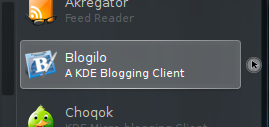
When you hover an item in the menu, a small icon that looks like a target with a mouse cursor drawn in it will appear. Instead of clicking, you can just hover the icon (or the area near it) and the item will be automatically activated.
Adaptive layout
The layout of the menu differs depending on the position of the applet which invoked it.
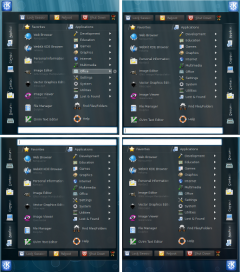
Always, the closest to the invoking applet (and the mouse cursor) are the section and system buttons, and the search box is on the opposite side since it has the focus by default and you don't need to click it in order to use it.
The sections are also reordered so that the Applications section is the closest to the mouse cursor.
Adaptive item sizes
The less items a list has, the larger the items and bigger the area for clicking.
When there are more items, Lancelot tries to show them all at once by reducing the size. If there are too many items to be shown all at once, the scrollbars are used as a solution.
Show sections inside the applet
If you think that the section buttons are too big and would be better if placed inside the panel itself, just right-click the applet, choose and .
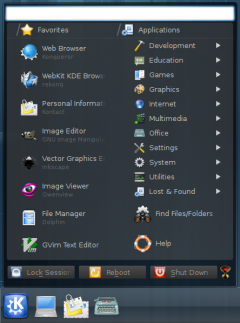
Show smaller section buttons
If you think that the section buttons are too big, but you don't want to place them inside the panel, just right-click them and choose .
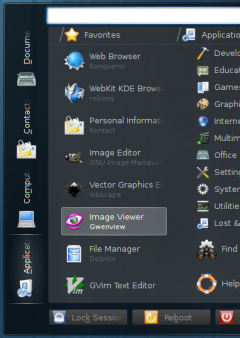
Custom system actions
If you don't use session switching (the 'switch user' feature), you can set different actions to the buttons in the bottom part of the window via the tab of the Lancelot's configuration dialogue.
Custom applications
You can choose which applications to show in the Documents and System sections via the tab of the Lancelot configuration dialogue.
Reordering items
You can change the order of favourite applications just by drag and drop. Mind that for it to work, you need to unlock your desktop first.
Some users prefer that the applications subcategories open in separate popups like they are used to from the classic menu from KDE 3. Since KDE SC 4.5, a new experimental feature was added to Lancelot which enables this behaviour.
To enable it, check the option in the tab of Lancelot's configuration dialogue.
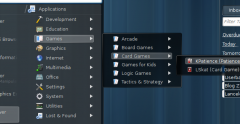
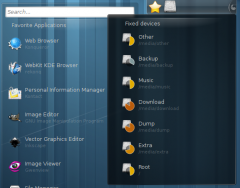
It is useful to have things that you use often placed on the desktop or the panel. For more info, see using the Shelf applet
